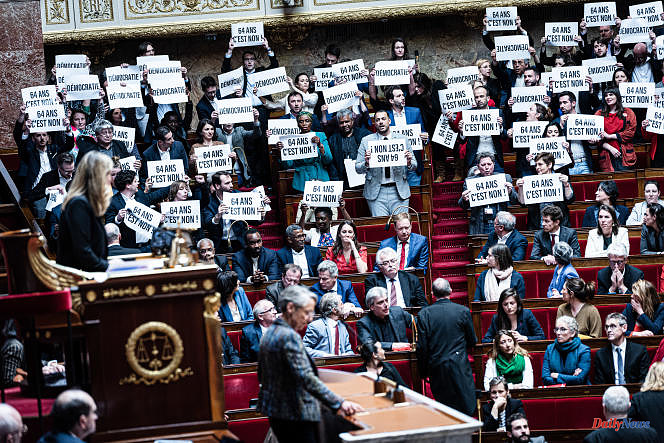The office of the National Assembly, its highest authority, sent Wednesday, April 5, a "call to order" to several dozen deputies, mostly "rebellious", to sanction behavior during the heated debates on the reform of the pensions "which damage the image of the institution".
About eighty deputies will be sanctioned in this way, a parliamentary source told Agence France-Presse. These include "deputies who held up signs or opposed the intervention of the ushers" on March 16, "thus causing a tumult", is it specified in the press release from the presidency of the Assembly.
The call to order, the weakest disciplinary sanction provided for by the regulations, "will be made individually to the deputies concerned". In addition to individual calls to order, all MEPs will receive a letter "reminding all the rules intended to frame and guide" their behavior.
Heckling, placards and Marseillaise
On March 16, in a deafening uproar, the Nupes deputies held up signs "64 years old is no" in the hemicycle and sang La Marseillaise, thus disrupting the speech of the Prime Minister, Elisabeth Borne, came to trigger 49.3.
Calls to order also target the deputies who had communicated on social networks during the closed-door debates of the joint committee between deputies and senators, on March 15, on the reform. Again, these are Nupes deputies.
In addition, several deputies are called to order for having "broken the rules of communication with the outside from the hemicycle", during a report broadcast on France 2, for which they had worn lavalier microphones. The LR deputy Aurélien Pradié and the socialist Arthur Delaporte are particularly concerned, according to a parliamentary source.
The Bureau of the Assembly, in which representatives of the various political groups participate, took its decision by "consensus, apart from LFI", reported a participant. The highest body of the Assembly "wishes to solemnly mark its disapproval of such actions which degrade the image of the institution and affect through it that of democracy", is it indicated in the press release from the presidency.
The group of LFI deputies denounced these sanctions, described as "a new act of authoritarianism by a bunkered political power, unable to understand that popular and parliamentary protest on the subject will not stop without withdrawal of the reform".












